Current as of: July 10, 2025 - 12:24
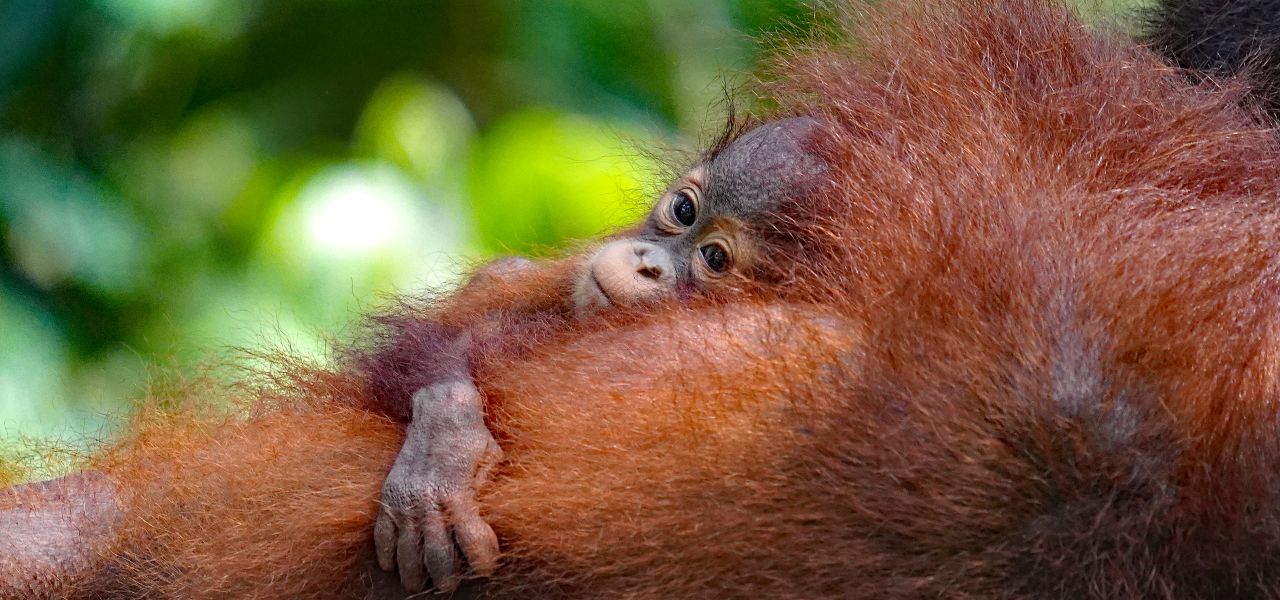
Borneo Wildlife Discoverer Trip Notes
- Ways to Travel: Guided Group
- Destination: Malaysia
- Programmes: Wildlife
-
Activity Level:
2 out of 7 - Easy & Moderate
- 15 Days: Land Only
- Ages: 16+
- Trip Code: WOH
- Carbon Footprint: 57kg CO2e
Trip Overview
Discover the best of Borneo – wildlife, rainforests and tropical beaches
Borneo is home to some of the most diverse and beautiful wildlife in Southeast Asia. This adventure covers many natural wonders, including majestic Mount Kinabalu and the Danum Valley, one of the trip highlights, for a jungle trek in search of the elusive orangutan. It’s a nature lover’s paradise, whose beauty and wildlife are equalled only by Bako and Mulu national parks, which we also explore. We come face to face with more orangutans in Sepilok, stay at a bamboo longhouse in Sabah, and finish the trip in the historic port town of Sandakan.
At a Glance
- Accommodation: 2 Premium nights (rainforest lodge), 11 Classic nights (5 hotel, 2 cottage, 2 resort, 2 lodge), 1 Simple night (Rungus longhouse)
- Travel by minibus, 4×4, boat and two internal flights
- Group normally 4 to 16, plus leader. Minimum age: 16
Highlights
- Join a small group in the wilds of Borneo to experience the natural world in full bloom
- Enjoy multiple chances to see wild orangutans and visit the Sepilok Orangutan Sanctuary
- Visit Mulu National Park in time to see the incredible bat exodus from Deer Cave
- Take a dawn cruise along Kinabatangan River – the perfect time to spot wildlife!
- Stay at Borneo Rainforest Lodge, an award-winning jungle resort in the Danum Valley
Is This Trip for You?
This trip is rated Activity Level 2 (Easy & Moderate) with a Wildlife Rating of Four. Visit our Activity Level Guidelines page for more on our trip gradings or our Wildlife Holidays page for more on our Wildlife Ratings. If you have any queries about the difficulty of the trip please do not hesitate to contact us.
Accommodation: There is a wide selection of accommodation, including hotels, national park lodges, river lodges, a five-star jungle resort and longhouse with shared bathroom facilities. We visit some remote, wild areas on this tour.
Weather: The climate tends to be tropical, which means it can get very hot and humid.
Walks: There are several hikes in the forest, though these are not strenuous.
Group
The trip is led by qualified English-speaking local leaders.
The trip is divided into two areas of Borneo, the Sarawak state (days one to five) and the Sabah state (days five to 15). We may have separate tour leaders in each state who are local from that specific state of Borneo.
There will also be local guides at national parks.
Adult min age: 16
Min group size: 4
Max group size: 16
Itinerary
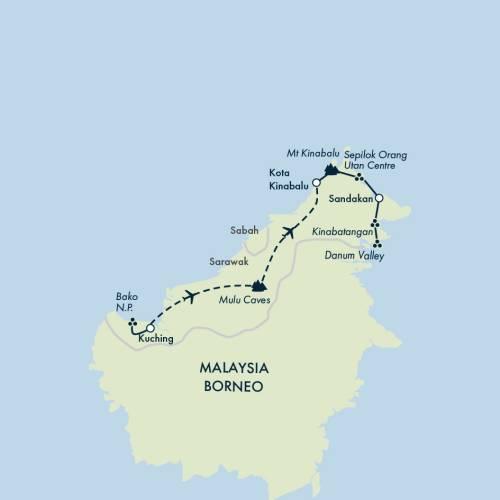
Land Only
- Start City: Kuching
- End City: Sandakan
Land Only Itinerary
Kuching, capital of the Sarawak state, is a vibrant riverside city full of different ethnic groups. With a great museum and a well-preserved colonial centre there is much to do in this cultural hot spot.
Around 6pm, say selamat petang to your tour leader and fellow travellers, when we gather as a group for the first time to get to know each other and learn more about the adventures ahead.
Your tour leader then ensures a big Malaysian welcome by arranging an optional group dinner at the waterfront hawkers’ stalls.
Want extra time in Kuching? Secure pre-tour hotel nights through your sales representative.
Accommodation: Hotel Lime Tree (or similar)
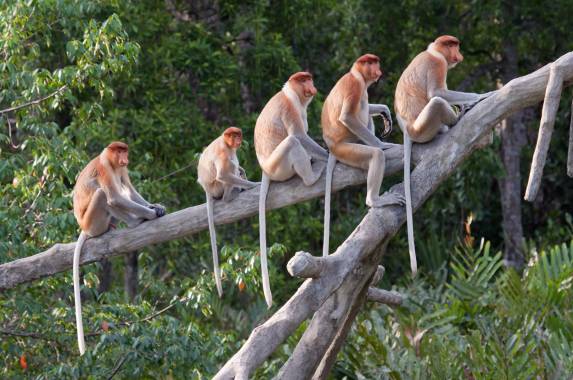
We enjoy our first foray into the amazing nature of Borneo as we head to nearby Bako National Park, home to proboscis monkeys. Here, the rainforest meets the sea and the only way to get to the park is by boat (after a one-hour drive out of the city). It has abundant wildlife, jungle streams, waterfalls, interesting plants, secluded beaches and trekking trails. Despite being the smallest national park in Sarawak, Bako contains almost every type of vegetation in Borneo. We return to Kuching for the night.
Please note, our time at Bako is often dictated by tides and weather conditions. Our leader will inform us of the details the previous day.
Accommodation: Hotel Lime Tree (or similar)
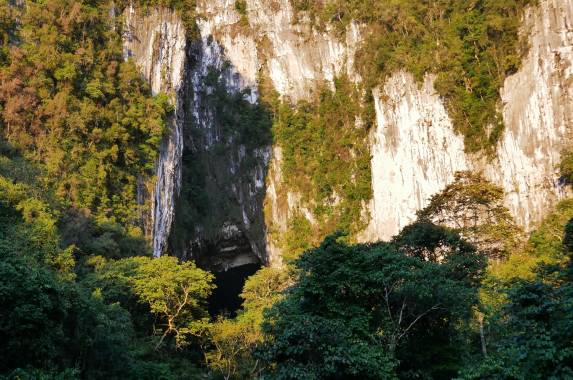
We leave the city and fly to Mulu National Park (schedules vary). After checking in at the park HQ, we meet the park guides and head through the forest to Deer Cave, the largest cave passage in the world and home to millions of bats and swifts. The floor has a raised platform, though that is no escape from the smell of guano (bird and bat excrement).
Nearby is Lang’s Cave which, though much smaller, has stalactites and stalagmites and other cave formations. The surrounding forest is spectacular and there is plenty of time to examine it closely.
The walk to Deer Cave is 1.9mi (3km) each way along boardwalks and there are wooden steps leading to different viewing platforms inside the show caves.
We arrive at Deer Cave in time for dusk, when the bats leave their home to feed on insects (as long as it is not raining). This is a sight to behold with the bats forming a long, snaking line across the sky for quite some time. Dependent on the timings of the day, we may visit the caves tomorrow instead.
Please note, due to flight schedules, there isn’t much time for lunch between our arrival at Mulu National Park and when we depart for the caves. You should buy something at the airport to have later.
Accommodation: Mulu National Park Garden Cottages (or similar)
Today we explore Mulu with a local guide. In the morning, we visit two of the show caves, including Clearwater, where we can enjoy a picnic lunch (not included) in the gorgeous riverside location. The park has some incredible statistics: it has more than 3,500 plant species, 8,000 types of fungi, and 170 orchid species. There are also 262 bird species, almost 300 butterfly species and many reptiles and mammals.
Members of the Penan people also live within the park. They are a small population of nomadic forest dwellers who live as hunter-gatherers. There has been fierce international opposition to the Malaysian government who tried to settle them in permanent longhouses and indeed the Penan themselves have resisted. In 1994, they were granted an area of the forest where they could continue their traditional lifestyle. Although you are unlikely to meet these elusive people, you occasionally see their fishing shelters or areas in the forest where they have recently visited.
This afternoon, relax in the park and listen to the weird and wonderful creatures that call it home or explore self-guided trails within the park.
Those with a head for heights can try the optional canopy walkway. This 1,575ft (480m) high skywalk takes approximately two hours to complete. Along the way, you may spot macaques, hornbills, flying lizards, squirrels and a variety of rainforest birds. Time slots are subject to availability. In the evening, there is an optional night walk or we can try tuak, the Mulu firewater.
Accommodation: Mulu National Park Garden Cottages (or similar)
This morning we bid farewell to Sarawak and our local Sarawak tour leader and aim to catch the morning flight out of Mulu and onto Kota Kinabalu in the state on Sabah, though delays are not uncommon. Depending on what time we fly out of Mulu, there may be time to walk along self-guided trails or peruse the visitor centre.
Known as KK to the locals, the capital of Sabah is a modern, multicultural city. Upon arrival in KK, we meet our Sabah tour leader for the remainder of the trip. The evening is free to relax, explore the busy Filipino markets or enjoy a waterfront sundowner.
Accommodation: Hotel Dreamtel (or similar)
Today you are free to enjoy some of the many activities Kota Kinabalu has to offer. A popular option is to visit one of the tropical islands in the marine park, a 15-minute boat journey from the city and with excellent snorkelling and diving opportunities. You can never be bored here, whether you are relaxing on the white sand, snorkelling or swimming in the warm South China Sea.
There are good birdwatching opportunities in the wetlands not far from KK and a culturally interesting village in Mari Mari where you can learn about the different cultures of Sabah. Your tour leader can help organise any of these options.
Accommodation: Hotel Dreamtel (or similar)
Today we transfer (about two hours) and explore Mount Kinabalu National Park. It’s a Unesco World Heritage site and home to the highest mountain in Southeast Asia, Mount Kinabalu, which stands at (4,095m) tall. This impressive granite peak can be viewed from the Crocker mountain range, which we pass over, with panoramic views of the countryside and soaring hills. The lower mountain slopes are covered in thick vegetation and it is well known for its diverse botanical and biological species.
En route, we stop at Nabalu market, where villagers sell their produce and handicrafts. It’s possible to walk through the plantation on your own if you want this afternoon. Tea, medicinal herbs, fruit and vegetables are just some of the local produce. From the plantation, the sunrise with a view of Mount Kinabalu is often spectacular. If we’re lucky, we can see the spectacular rafflesia in flower nearby or en route to the plantation.
Accommodation: Sabah Tea Gardens Longhouse
We visit the tea factory before we leave the plantation behind and continue our journey to eastern Sabah. Our destination is Sepilok, home to a well-known orangutan rehabilitation centre. The journey is about five hours and we stop at the Sandakan War Memorial enroute. We then continue to our lodge in Sepilok. This evening, as dusk approaches, we head to the nearby Rainforest Discovery Centre, which has fantastic bird-watching opportunities (though luck does play a role) as hornbills and Borneo bristleheads are often seen. Orangutans are also spotted during the fruiting season and there is an impressive canopy walkway plus easy walking trails.
Accommodation: Sepilok Jungle Resort
Up early, there will be the option to enjoy an early morning walk near our resort for more birdlife and wildlife viewing before breakfast. We then visit Sepilok Orangutan Centre, the largest orangutan sanctuary in the world. Here rehabilitated orphans and captured orangutans are cared for until they are ready to be released into the wild. We can see these incredible relations of ours close-up and learn about the threats to their existence. You have the chance to visit both morning and afternoon feedings. There is also an orangutan nursery where youngsters are trained to climb with the aim of reintroduction to the wild. We have the chance to view the youngsters from a special viewing platform that sits behind one-way glass so as not to disturb or influence them.
There is the option of visiting the Bornean Sun Bear Conservation Centre, which works to research, rescue and rehabilitate captured bears and provide education to the community.
Accommodation: Sepilok Jungle Resort
After breakfast, we depart Sepilok and transfer (approximately two to three hours) to the third-longest river in Borneo, Kinabatangan.
Our lodge is by the mighty Kinabatangan River, an area home to an astonishing array of wildlife including 10 primate species, four of which are endemic to Borneo. It has one of the highest concentrations of proboscis monkeys and orangutans in Malaysian Borneo. Other wildlife includes Bornean gibbon, long-tailed macaques, sun bears and barking deer. The Asian pygmy elephant and clouded leopard also inhabit this area, but sightings are rare. There are also more than 200 bird species, including hornbills, eagles, herons, kingfishers, oriental darters, night jars, flowerpeckers and spider hunters. Later this afternoon, we take our first river cruise.
Accommodation: Tanini Kinabatangan (or similar)
We are up with the animals for a dawn wildlife cruise followed by a trek. In the afternoon, we once again take a river cruise to spot wildlife and, if we are lucky, a crocodile or two.
Accommodation: Tanini Kinabatangan (or similar)
We drive to Lahad Datu (approximately two to three hours) where we change vehicles and drive off-road into Danum Valley conservation area (approximately three hours), one of the last remaining pockets of primary lowland rainforest in Asia.
Danum Valley is at the forefront of tropical rainforest research, and home to many rare and endangered mammal and bird species – it is a real privilege to spend two nights here in the comforts of the Borneo Rainforest Lodge.
Danum Valley is probably the best place in Malaysia to see wild orangutans in their pristine habitat. Apart from orangutans, it has just about the complete range of Bornean wildlife and great trails. After settling in, we take an afternoon jungle trek to search for the elusive orangutan. After dinner, we can take a night drive to spot many of the shy forest creatures. We spend our time here with very experienced guides who accompany us on all walks. One night drive and one night walk is included during our stay.
Accommodation: Borneo Rainforest Lodge
We spend a full day with our experienced guides. We can explore the trails, canopy walkway and waterfalls searching for wildlife. The trek to a lookout point over the Danum Valley takes approximately 1hr 30min each way. Danum is home to more than 275 bird species, 110 species of mammals including orangutans, five species of deer, giant flying squirrels, gibbons, bearded wild boars, flying frogs and the Borneo pigmy elephant.
Accommodation: Borneo Rainforest Lodge
Journey to Sandakan (approximately five to six hours). Home to many Chinese and Filipino people, it was once a huge logging centre, first exporting wood in the late 1880s to supply the building of the Temple of Heaven in Beijing. The waterfront is the place for an evening walk and the rooftop restaurant at the Nak hotel is great for a cocktail or two.
Accommodation: Sabah Hotel (or similar)
Our Borneo adventure ends after breakfast. Depending on your flight, you may have time to enjoy the hotel pool or explore Sandakan more before beginning your return journey home. Alternatively, speak to your sales representative to extend your stay in Borneo.
Accommodation
Hotels, lodges and traditional Rungus longhouse
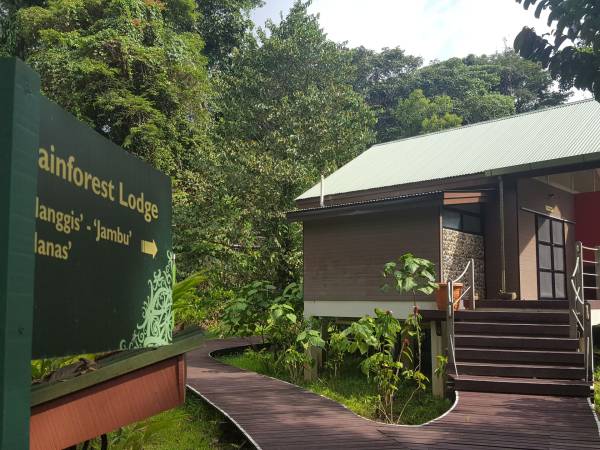
On this Borneo adventure, we spend 13 nights in hotels and lodges, plus one night in a traditional Rungus longhouse. The accommodations typically used are on the day-to-day itinerary. However, below are some of the notable places we stay on this trip.
Kinabalu National Park: Sabah Tea Gardens Longhouse (night 7)
Experience the traditional local life with a stay in a reconstruction of a Rungus longhouse. In a peaceful spot surrounded by forest-cloaked hills, the building is made entirely of bamboo, with rattan walls dividing the rooms. Rooms are simple with mattresses on the ground, mosquito nets and ceiling fans, while bathroom facilities are shared with hot showers.
Danum Valley: Borneo Rainforest Lodge (nights 12-13)
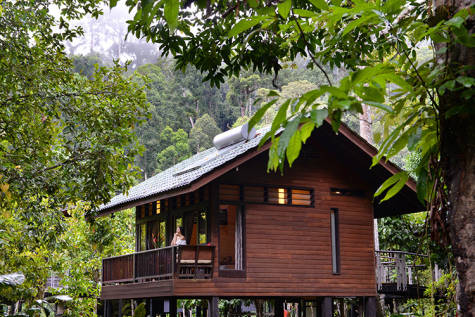
Experience one of our best-loved places to stay – an award-winning resort in one of the oldest and most biologically diverse rainforests in the world. Each of the 31 chalets here resides within the 130m-year-old rainforest and comes with natural bath amenities. There’s also the Jari Jari Spa, which offers Sabah remedies, while the restaurant serves Asian and Western cuisines with views of the jungle greenery. With a strong focus on sustainability and offering unique wildlife-life viewing opportunities, our two-night stay here is a highlight of the trip.
Worth knowing
- While the resorts we stay at in Borneo (Sepilok and Kinabatangan) are modest, they have been selected due to their proximity to wildlife activities included on the trip in conjunction with reduced accommodation options in the area.
- Single rooms are available (subject to availability) for a supplement for 10 hotel/lodge nights only (singles are not available in Mulu National Park or the Danum Valley). Please advise your sales representative at the time of booking if you would like to request a single supplement.
Single supplement from £ 390
Food & Drink
All breakfasts, four lunches and four dinners are included.
You should allow about 555-850 Malaysian ringgits (US$130-US$200) for food not included. If you fancy a few drinks, you may want to bring a little more as beer and other alcoholic drinks are expensive – expect to pay Western prices.
Malaysia is renowned for its culinary excellence; however, food can often be relatively unexciting and limited in the lodges and for hotel breakfasts.
Meals are more varied in the cities and seafood is widely available on the coast. In the bigger hotels and cities, a full range of Western and local foods are available. Most meals are basic, based around rice and noodles although most accommodations offer a Western breakfast of beans, toast and eggs. You can generally avoid spicier food if you wish.
Vegetarians are well catered for, but may find the food choice limited. Please inform us before departure of any special dietary requests. Please note, the availability of certain products is minimal or non-existent (for example wheat- or dairy-free), please be prepared for this as you may need to bring these from home.
Transport
We use several different modes of transport. Most transfers will be in private minibuses. We use several different boats varying from simple longboats to river ferries. We also have two domestic flights into and out of Mulu National Park.
Weather & Seasonality
Borneo has an equatorial monsoon climate with the weather remaining similar throughout the year. It is hot and humid; temperatures are 23C-33C (73F-91F) during the day and rarely drop below 20C (68F) at night. The rainy season is from November to January and the dry season is from May to September, though it can rain at any time. A Borneo rain shower is quite an event.
Weather Charts
Miri
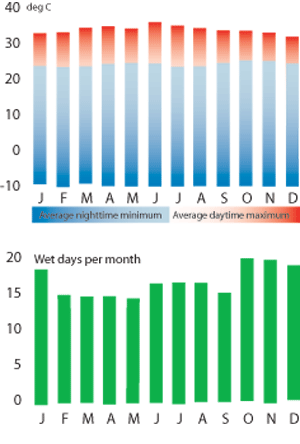
Joining Instructions
Key information
Start hotel: Hotel Lime Tree, 317, Jalan Abell, 93100 Kuching, Sarawak
Phone: +60 82-414 600
Recommended arrival time: You can arrive at any time today, there will be a welcome briefing around 6pm.
Airport: Kuching Airport (KCH)
Getting to the start hotel
The start hotel is approximately 20 minutes’ drive from the airport. Exodus provides one group arrival transfer from the airport, which is timed to coincide with the arrival of a chosen flight from London, UK. You may join this transfer at no extra cost, provided you can be at the airport before the transfer leaves. Speak to your sales representative for the group arrival transfer times or to arrange a private transfer.
If you would like further information on joining this trip, please speak to your sales representative.
Catching your return flight
There’s a group departure transfer to Sandakan Airport (SDK) for customers who Exodus booked onto a chosen flight to London, UK. Please speak to your sales representative if you wish to join. If the group departure transfer does not suit your flight time, speak to your sales representative to arrange an alternative transfer.
Full joining instructions including local emergency numbers will be sent to you as part of our Final Joining Instructions. If you do not receive these at least a week before departure, or require them earlier please contact our office or your travel agent.
Location start: Kuching
Location end: Sandakan
What To Take
Essential Equipment
- Small backpack for carrying cameras, waterproofs etc during the day. Plastic bags or waterproof/dry bags are recommended for your day bag
- Casual clothes suitable for the hot, humid climate. Please note, women should dress conservatively in Muslim-majority areas (no vests and knee-length shorts) so as not to cause offence
- Insect repellent
- T-shirts and long lightweight trousers (pants) for the forest and national parks
- Swimming costume
- Leech socks (though trousers tucked into long sports socks works just as well)
- Walking boots
- Head torch (flashlight)
- Large refillable water bottle
Please note, luggage frequently ends up missing the connecting flight in Kuala Lumpur and arrives later that day. Therefore, you may want to bring clothes in your carry-on to change into upon arrival.
Water included
Plastic bottles are a big issue in many countries where recycling isn’t yet widely available; they often end up in landfill or get burned. Both processes are harmful to the environment and we would like to reduce our impact here. For your trip, we provide an alternative to single-use plastic bottles to reduce the plastic used. This means that safe drinking water will be available throughout; all you need to do is bring a bottle to refill along the way. Please add this to your packing list.
Optional Equipment
- Binoculars
- Flip-flops or trekking sandals for getting in and out of boats
- Ear plugs
- Walking poles
Practical Information
Visa
Malaysia
Travellers from the UK, US and EU normally do not need a visa to enter Malaysia. Please note, visa requirements often change and it is your responsibility to obtain any required visas for this trip. Therefore, we recommend that you check with the nearest embassy or consulate of your chosen destination(s), including any countries you may be transiting or transferring through.
Some local governments provide guidance on what visas their citizens need. To help, we’ve gathered a selection of useful links below.
- Australia: www.smartraveller.gov.au/destinations/asia/malaysia
- Canada: www.travel.gc.ca/destinations/malaysia
- United Kingdom: www.gov.uk/foreign-travel-advice/malaysia/entry-requirements
- USA: www.travel.state.gov/content/travel/en/international-travel/International-Travel-Country-Information-Pages/Malaysia.html
Important information
All foreign visitors must now complete and submit the Malaysia Digital Arrival Card (MDAC) within three days (including date of submission) prior to their arrival in Malaysia.
To complete the MDAC form, you need to add your date of arrival/departure in Malaysia, passport details, and accommodation (the start hotel of your tour). To obtain these details, please refer to the Final Joining Instructions, which are sent one to two weeks before your departure.
Once the MDAC form is submitted, you will receive an email with a PIN to check your registration on the MDAC website where you can download a PDF copy of your authorised MDAC. It is advised to also print a copy of your MDAC for immigration. All visitors must then present their printed, completed form and their passport at immigration upon arrival in Malaysia.
Your passport must be valid for at least six months from the date you arrive in Malaysia.
Vaccinations and Health
Malaysia
There are no mandatory vaccination requirements. Recommended vaccinations are: Polio, Tetanus, Diphtheria, Typhoid, Hepatitis A. The risk of malaria is slight, but you may wish to consult your GP or travel health clinic for further advice.
Dengue and zika fevers, both spread by mosquitoes, are known risks in places visited. There are currently no vaccines or prophylaxes available; therefore, we recommend you take the usual precautions to avoid mosquito bites.
Local Time
Malaysia's time zone: Asia/Kuala_Lumpur (UTC +08:00)
Electricity
Malaysia's electricity: Plug type G (three rectangular pins) – 240V, 50Hz
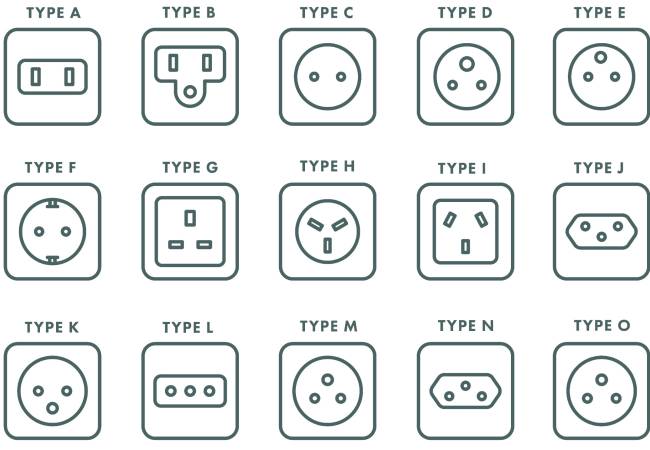
Money
Malaysia's currency: Malaysian ringgit (MYR)
ATM Availability
ATMs are becoming more widely available and are the easiest way of obtaining money; please inform your bank before leaving home if you wish to use it in Malaysia, as some cards have been blocked in the past after only being used once. Most credit cards are accepted in the main towns in Malaysia.
Either US dollars or British pounds can be changed in the main towns, but this can be time-consuming. Please don’t bring travellers cheques. A small amount of cash is useful for emergencies.
Extra Expenses & Spending Money
As you will probably be carrying much of your money in cash, we strongly recommend using a money belt. All your documents should be kept in waterproof plastic bags: the rain tends to come in very heavy showers.
There is very little to spend your money on while on the trip, apart from the odd local handicraft though there are some good T-shirts and souvenirs in the national parks.
There is a camera fee of 10 ringgits (US$2.35) in Sepilok.
Optional Excursions
Please note, all prices listed below are ‘prices from’ and are subject to change.
Mulu
- Canopy walkway: 48 ringgits (US$10.11) per person (limited availability in busy season)
- Night walk: 25 ringgits (US$5.27) per person
- Private night walk: 30 ringgits (US$6.32) per person (minimum 4pax)
Kota Kinabalu
- Snorkelling and island trip costs vary depending on group size
Tipping
Tipping is customary in Borneo but is entirely at your own discretion.
On arrival, the leader will suggest to the group they donate 200 ringgits (US$50) per person towards a kitty. This money is then used for tipping local guides, hotel porters, drivers etc. If you prefer not to contribute, you are free to opt out.
The trip is divided into two parts, the Sarawak region and the Sabah region of Borneo, and we have separate tour leaders for both states. The sum you choose to give to each leader is entirely personal, but as a guide, 15 ringgits per person per day for each leader (for the days where they lead your group) would be a reasonable starting point. The ‘tipping kitty’ explained above is entirely separate from any contribution to the tour leaders.
Sustainability and Impact
As a certified B Corp, we’re on a mission to improve our social and environmental impact across all our adventures.
We do this through our innovative Thriving Nature, Thriving People plan.
This ‘nature positive’ approach is designed to help nature and communities thrive in harmony though practical solutions, such as reducing carbon and waste on our trips, supporting conservation projects through the Exodus Adventure Travels Foundation, and rewilding 100 square metres for every Exodus traveller.
Important Information
Water safety
This trip includes time by a lake, river or sea, where there may be opportunities to swim. You should always seek local advice before deciding whether to swim. Open-water or wild swim spots should be treated with extreme caution. Information on how to keep yourself safe while swimming is shown here.
Your safe participation
When booking this trip, you should be confident in your ability to participate in all activities described in these Trip Notes. If you have any doubt about your suitability, please call us and ask to speak to one of the experts on this itinerary.
Although our leaders are well trained to deal with different capabilities, if they have any concerns about someone’s ability to safely take part in an activity, or their impact on other people’s enjoyment, we authorise them to take necessary action which, in some circumstances, may involve asking someone to miss that activity.
By booking this trip you agree to our Booking Conditions which clearly state that our leaders have the authority to do this. In these rare instances we will ensure anyone sitting out is safely provided for and offered alternative options where possible. Refunds will not be provided for activities missed and customers may be liable for additional costs incurred.
Seatbelts
All vehicles used by us should be equipped with working seatbelts, except where approved by us based on the vehicle type or journey. Wherever seatbelts are available, we require our customers to use them for their own safety, even where it may not be a legal requirement.
How To Book
- Check availability: Go online to check availability, or contact us by phone or email.
- Secure your place: You can provisionally hold a place on this trip, usually for between three and seven days.
- Complete your booking and payment
When you’re ready to book, go to our website for online bookings, book over the phone or you can complete a booking form (available online or on request by calling us). We accept all major credit and debit cards.
After booking
You will receive your booking confirmation letter and invoice, which includes extra information and guidance about your travel arrangements.
Full joining instructions, including local emergency numbers and details of how to reach the start point, will be sent to you approximately two to three weeks prior to departure. If you do not receive these at least a week before departure, or require them earlier, please contact our office or your travel agent.
Trip Note validity
These Trip Notes are valid from the “Current as” date on page one. They will occasionally be updated after booking and before departure; if there are any updates that significantly impact the inclusions or itinerary, customers will be written to separately. They will also receive a link to the most up-to-date Trip Notes with their Final Joining Instructions before travelling.
The information in these Trip Notes is given in good faith. Where differences exist between the Trip Notes and our current brochure or website, the Trip Notes supersede the brochure and website. All holidays can be subject to unexpected changes; to enjoy them you should be prepared to be flexible where necessary. Occasionally, it may not be possible to follow the itinerary as planned. This may be for a variety of reasons – climatic, political, physical or other. In these circumstances we will make the best-possible alternative arrangements that maintain the integrity of the original itinerary.
Licensing
Exodus is fully licensed and bonded as a tour operator. We hold Air Traffic Organisers Licence (ATOL) number 2582, issued and bonded with the Civil Aviation Authority (CAA). We are also bonded to the International Air Transport Association (IATA) and we are members of the Federation of Tour Operators (FTO) and ABTA – The Travel Association. This means you can book your Exodus holiday with confidence, as all money paid to us for your trip is fully protected.
